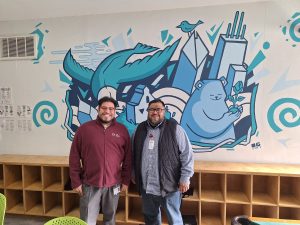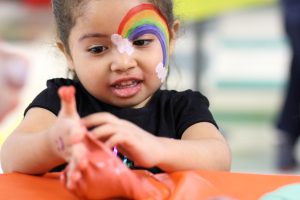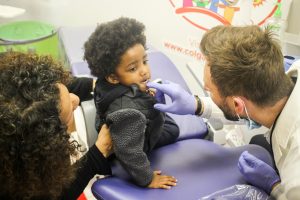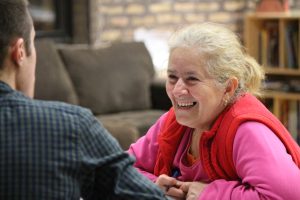Erie House takes ‘holistic approach’ to helping families
By Kevin Beese Staff Writer — January 9, 2024
Roberto Mendez (left) and Isaias Solis, leaders with the social service agency Erie Neighborhood House, stand in front of a mural inside their facility in Chicago’s West Town neighborhood. The agency is receiving a $200,000 Illinois Department of Public Health grant for mental health workers at four Chicago schools. (Kevin Beese/Chronicle Media photo)
Second in a periodic series looking at agencies addressing childhood health and mental health issues after COVID-19.
Isaias Solis says his social service agency has seen an increase since the COVID-19 pandemic in students’ talking about traumas they’ve experienced.
“I don’t want to attribute everything to COVID, we want to say that after COVID we saw more children who were sharing stories with us that we’re like ‘You know what, we might need to make sure they talk to a social worker, a therapist after receiving parental support so that they an get more mental health support,’” said Solis, senior director of programs for Erie Neighborhood House.
The social services nonprofit offers programming and resources for children and youth, mental health and community wellness, adult education and training, and legal services.
Solis said providing youths with coping mechanisms and ways to manage their emotions are key to keeping them on track.

A child creates during the Erie Neighborhood House daycare program. (Erie House photo)
He noted it is also key to change educators and parents’ mind-sets from “What’s wrong with this kid?” to “What happened to this child?” Solis said Adverse Childhood Experiences are a legitimate concern for youths serviced through Erie as the events can affect individuals’ physical and mental health,
Solis said that 67 percent of adults in the United States have had at least one ACE event and that 17 percent of people have had 4 or more ACE events.
“You see more ACES in communities with historical social and economic inequities, hence Chicago,” Solis said.
Roberto Mendez, director of marketing and communications for Erie, said the agency takes “a holistic approach, ensuring we involve the entire family unit when they are available.”

A youth gets a dental checkup during the Bright Smiles program (Erie House photo)
“We really work with the parents for them to do the work,” Mendez said. “They may end up moving. They may not be here next year. If that happens, at least they have the tools they can take with them to continue doing the work.”
Erie House is getting a $200,000 grant from the Illinois Department of Public Health that it will be using to bring on two master’s level social workers as mental health workers
They will work at two schools in Chicago’s West Town neighborhood and two schools in Chicago’s Little Village neighborhood, helping to ensure the staff understand the impact of ACES and making sure they connect parents with available resources.
Although grateful and appreciative of the IDPH grant, Solis noted the money is “a drop in the bucket in terms of what we are talking about: education, prevention, making sure people are knowledgeable and understanding of what ACES are, knowing traumatic experiences,” Solis said. “The kind of funding that goes into mental health support is not adequate at all.”

A participant shares a laugh with the instructor during a Erie Neighborhood House community literacy program. (Erie House photo)
He said that too often individuals are having to wait months to get in to see a mental health professional, especially Spanish-speaking health professionals.
Mendez said every grant like the IDPH endowment helps cut into wait times for individuals to get mental health services.
Solis said taking away the stigma of mental health, especially in the Latino community, which make up a large portion of the Erie clientele base, is its own challenge. He said intimacy, keeping family information within and not disclosing, is part of the Latino heritage.
“It’s OK to see a therapist. People shouldn’t think it’s out of the norm or there’s something wrong with their child,” Solis said. “It’s more saying, ‘How do we support you and your child to have a healthier and fulfilling life?”
Mendez said there is “no cookie cutter answer” to handling issues in the Latino community.
“We meet the client where they’re at,” Mendez said. “Some are more receptive to therapy, especially if they have young adults in their life who have already started breaking the stigma. Someone who has no exposure to therapy and has those negative stigmas that will take a little more work to get them to the point if they want to get involved with mental health services.”
Maybe parents are uncomfortable coming to a therapy session, Solis said, but they will come to an educational session about stressors in the community and resources they can use. By going in steps, maybe the parents eventually wind up in that individual therapy session, he noted.
Solis said it is important that Erie social workers and school personnel are on the same page and “speaking the same language” when it comes to students’ mental health.







